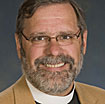Commentary on Psalm 103:[1-7] 8-13
In my preaching classes at Trinity Lutheran Seminary we talk often about “ignore-at-your-peril” preaching situations.
In many worshiping communities in the United States, the tenth anniversary of 9/11 — falling on a Sunday — will qualify as one; I’ll come back to that in a few hundred words.
As a response to the first lesson from Genesis 50, these verses from Psalm 103 could provide hymn texts for Joseph and for Joseph’s brothers. Verses 1-7 would be the song of pious Joseph who suffered deep wrong at the hands of his envious brothers and had ample reason to question God’s sovereignty.
Instead, the singer remembers “all God’s benefits”: forgiveness of sin (pride for Joseph), deliverance from the grave (the pit and then slavery); crowing with mercy (not to mention the literal “crown” of Pharaoh); and vindication — to the point that Joseph can find God’s hand at work in the evil deeds of his brothers.
Verses 8-13 would be the song of Joseph’s thankful brothers when they hear Joseph’s words of pardon. Joseph’s forgiveness bears witness to the God who is full of compassion and slow to anger and who does not deal with us according to our sins or repay us according to our iniquities. And as Joseph draws his father and brothers west toward Egypt, the memory of their sins is blown as far to the east as can be imagined.
The imperative to “bless the LORD” might strike some as odd since God is usually the one blessing us. Most commentators counsel that “bless” should be taken here to mean “thank.” The psalmist enumerates the benefits for which blessing and thanks are to be given; any one of these might provide an entry point for a sermon whose intent is to proclaim God’s benefits to a congregation or its members (even if they haven’t suffered in quite the ways Joseph did!): God forgives sin; heals diseases; redeems our lives from the grave; crowns us with love and mercy; and satisfies our desires with good things (so that our youth is renewed like an eagle’s. How exactly is an eagle’s youth renewed? By molting? It’s a grand image, if a bit obscure!).
Psalm 103 also solicits our blessing (thanks) for God’s character. God is slow to anger and then even when angered, God does not hold a grudge or consider our sins when dealing with us. In God’s atlas, our sins are as distant from us as east is from west (and no, it is not a globe, they do not meet again on the other side!).
Those who choose to engage the entire psalm will hear later that God’s mercy comes in part from God’s intimate knowledge of human nature and character: God knows we are mortal, evanescent — here then gone in a blink of God’s eye. And God knows that in spite of our hopelessly limited temporal and spatial perspectives, we presume to live and act as if we know anything (sometimes even everything). To this arrogance God responds with merciful patience and understanding.
Verse 6 contains, to my hearing, the most provocative phrase in the psalm and it relates to this question of limited perspective: “You provide vindication …” Vindication has many layers of connotation; it can be a simple synonym for justice, deliverance, or vengeance. But at a deeper level vindication occurs when a point of view, belief, or action that has been condemned, dismissed, or undervalued is shown finally to be true — sometimes by the endorsement of some authority; sometimes by a surprising unfolding of events.
And while being vindicated (especially after persecution for holding an unpopular minority view) often leads to smugness, it is also possible to imagine vindication leading to relief, joy, and reunion (as it does for Joseph and his family). In Psalm 103:6 the implication is that the people of God, who are currently under oppression and who might be ridiculed for clinging to hopeful stories of God’s former acts of deliverance, will have their trust vindicated when God again acts.
With all that said, when I’m sitting in the pew on Sunday, September 11, I will have the attacks of 2001 on my mind. My head will be muddled with the remnants of several days of media opining — from widely divergent viewpoints — about terrorism, Islam, interfaith dialogue, al-Qaeda, revenge, justice, immigration, security, patriotism and everything that “makes America great.”
I live in a theological tradition (Lutheranism) that strives to “call things what they truly are” so I know that in the intractable conflicts between cultures and ideologies no side can ever be called “innocent” or “guilty” and no person, nature, or culture intrinsically “evil” or “good.” I know that in the real-life cycles of oppression, distrust, violence, and intolerance there is no place where the buck stops. I know just enough to know that God’s vantage is the only perspective whence Truth can be known and that no one but God dwells there.
So, what I want from a sermon on Psalm 103 is for you to meet me at the intersection of verse 6 (“O LORD, you provide vindication and justice for all who are oppressed.”) and verse 10 (“You have not dealt with us according to our sins, nor repaid us according to our iniquities.”). Help me to rise above my limited perspective where I’m tempted to bemoan one people’s suffering and oppression (mine) more than another’s; give more weight to one nation’s (mine) innocent dead than to another’s; and more slack to one ideology’s (mine) blind spots than to another’s.
Proclaim God’s vindication of those of us whose hearts break and heads burst at the unfathomable complexity and ambiguity of world events and who yet dare to trust in God. To the extent that you dare, imagine and help reveal the will and mission of the Holy One who can see all the way to the west and the east simultaneously.

September 11, 2011